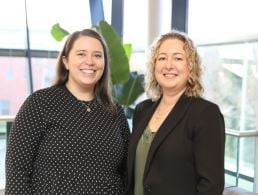A pioneer and specialist in the development of online curricula and assessment, Dr Jeremy Williams (pictured) is Director of Instruction and Assessment and Associate Professor in E-Learning at Universitas 21 Global. Last week he brought the first online MBA course to Ireland and believes that the time has come for online learning to take its place in the mainstream of the academic world.
First, however, he faces a battle with the old guard of crusty academics who believe that learning is all about dusty libraries, chalk and lecture halls.
Last week, Dr Williams strode into Dublin amidst a storm of publicity, with Government chief whip and Information Society Minister Mary Hanafin TD, no less, stating that e-learning will be a key part of the Government’s plans to role out decentralisation to over 10,000 civil servants. She made the comment while introducing a new fully online MBA course, accredited to more than 16 universities worldwide, available to Irish students.
The course is offered and accredited by the prestigious Universitas 21 Global – a Singapore based network of Thomson Learning and 16 member universities in nine countries including the US, Canada, Britain, Sweden, Germany, New Zealand and Australia.
Member universities enrol more than 500,000 students and employ over 40,000 academics globally. The course is being offered in Ireland in conjunction with PAI Publications Ltd, the publisher of Public Affairs Ireland Journal, the leading guide to legislative, regulatory and public affairs in Ireland.
The e-MBA course offers a large selection of modules that may be tailored to the choice of the individual student. While there are 10 core subjects, there are another seven electives, which enable selection of relevant modules. The final section of the course is a research project, which typically relates to one’s area of work.
“Class” sizes are kept to about 20 students. The programme content consists of online web-based lessons and textbooks. Students maintain constant contact with their instructor and classmates, and communicate in various ways including discussion boards and emails. The Universitas 21 MBA student uses real world experiences in individual and team-based assignments, projects and case studies.
Describing the importance of e-learning to the information society, Hanafin said: “The need for lifelong learning is a reality and the internet has a key role to play in helping people to secure further education without being constrained by their physical location and occupational or family pressures.
“The Information Society requires that such choices must be available to everyone, regardless of location or personal circumstances and this course can play a key role in achieving this objective. I see it as particularly important in the context of the Government’s programme of decentralisation,” Hanafin said.
Although e-learning has been a byword of electronic business over the past five or six years, Dr Williams is confident that it will become a mainstream arena of education. “It’s just beginning to take off. I first started dabbling with it in 1993, when it was called computer based teaching. However, at the end of the Nineties people started setting up e-learning companies with no credentials that were simply cutting and pasting documents into HTML. Now the e-learning space is beginning to mature.
“This is why I moved from campus-based education to online education, ensuring the existence of high quality material that will provide opportunities for large numbers of people to experience good learning. It has taken a ling time but as educators we have reached the point where we can provide students with a number of different ways of learning. On campus you are mostly scribbling notes. With the internet there are opportunities to have more choice in terms of learning mechanisms. Content is everywhere.”
However, the spectacular failure of e-learning companies in the inevitable tech downturn of 2001 left a few noses out of joint in the investment community and did little to encourage future adopters of the standard. “They definitely muddied the waters. It’s not been easy for us to convince people of the benefits of e-learning. What we’re about is doing something about that. In terms of finance we have funding of US$50m and the reputations of 16 bricks and mortar universities behind us. We are making a serious attempt to add a dimension of quality to the online world. We are the only truly global business school in the world.”
Yet what has Dr Williams really fired up is the potential impact e-learning and the internet will have on society as an equaliser between rich and poor. “What it does is provide opportunities to people that would never have come their way otherwise. It will be a long time yet before people in the lower echelons of society have access to the learning opportunities that are available to the middle classes. What we are doing is providing an opportunity for well qualified late 20s, early 30s people, who are mid-career to enrol for an MBA when their lifestyle won’t otherwise allow it. We can get around people having to move location and upset their jobs.
“We are attacking a niche in the marketplace with a versatile product. It will be a long time yet before that opportunity is extended to society at large. But connectivity is greater than it was. I visit India a lot and everywhere they are putting cable in the ground. To say that learning will change the world would be fatuous. That said, I’m excited about the near-term possibilities.”
In order to ensure mainstream success, Dr Williams says the MBA course has to adhere to the strict guidelines of the 16 sponsoring universities. In other words, they won’t accept just anyone. “Firstly, we have to satisfy entry requirements. Our academic backers are universities with their own MBA programmes. We insist on work experience; most applicants have that. We look to completion of an undergraduate degree, an exceptional mission category and other dimensions in the candidate. We also look closely at written applications, which include four short essays. It is quite a stringent vetting process.
“Once they are in on the programme, there is a high level of interaction, engaging with the course through asynchronous bulletin boards, links to various websites, flash animation, and opportunities to chat to fellow students. We generally expect people to have finished by five years max. Eighteen months is the earliest expectation. We have 314 enrolled students at the moment. We are not constrained by the semester system.”
Dr Williams is nonetheless confident that within 10 years e-learning and online universities will be part of the mainstream. “I truly believe that my job title – professor of e-learning – has a limited shelf life; e-learning will simply become learning. Not any time soon, but pace of change is increasing at an exponential rate. The biggest obstacle will be the ‘dyed in the wool academics’, a very conservative bunch. To throw text books aside and say ‘okay we’re going to do things differently’ is very hard for some people. However, we will get to the point where there will be a critical mass of individuals that will tip the balance. E-learning will become learning just like e-commerce is becoming commerce.”
He concludes: “Email, instant messaging, the internet and mobile phones are all pervasive in the business world and it is logical that we’ll use these tools for education. Most business schools are the same model as the traditional academic world. But sooner or later even that’s going to change.”
By John Kennedy




